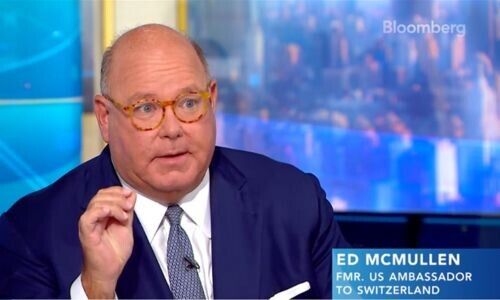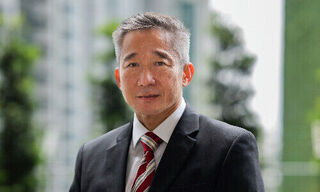Ex-Ambassador: «Ermotti is One of the World's Best Bankers»
In an exclusive interview with finews.asia, former US Ambassador to Switzerland Edward McMullen shares his perspective on two Credit Suisse-era controversies making headlines. He stresses the need for transparency and highlights how seasoned banking leadership previously ensured smoother relations with US authorities. While advocating for swift resolutions, McMullen reveals he will miss the presidential inauguration to speak at Davos, signaling his ongoing engagement in Swiss-US relations.
Ambassador McMullen, in the last weeks, two judicial and political issues from the Credit Suisse era have surfaced in the US: allegations by the US Senate Budget Committee about Nazi accounts and violations of a tax evasion guilty plea from 2014, also covered by finews.com. Did you come across those during your tenure as ambassador to Switzerland?
None of these issues ever came up during my term as ambassador. Everything had been well resolved and our administration made a point of sticking to foreign direct investment, trade deals, exchange of innovation, alignment on international affairs, the Swiss protective role, and other issues that were important to the bilateral relationship.
Let’s talk about the Nazi-era allegations first. They were first raised by the Simon Wiesenthal Center and are now investigated by Neil Barofsky under the auspices of the Budget Committee. Did they come as a surprise to you?
Yes, because everyone believed things were resolved and that we had moved on. That's how we worked and operated in the first Trump administration. Then, in this last administration, several things arose that were controversial. Unfortunately, they represent a diversion from the importance of continuing to focus on what strengthens our bilateral relationship.
What is your opinion on this issue?
Banking issues are important, and if there have been mistakes, I want to be very clear: I'm not advocating that we gloss over anything that was done incorrectly.
The Swiss view is broadly that the Nazi era has been thoroughly investigated in the late 1990s and that Judge Korman’s settlement from 1999 was comprehensive. On finews.com, Thomas Borer made this point. You’ve read his thoughts.
If Markus Diethelm were still the chief legal at UBS, this would never have happened. He has an established relationship with the Justice Department, the respect of the Justice Department, which is why things were resolved in moving forward so well with the banking world, also in the past. Markus was someone who the Justice Department understood was transparent, honest, engaged, had relationships, kept people informed, and there were no surprises. Unfortunately, when you don't have that, you wind up with an unfortunate situation for Switzerland, UBS and for the US-Swiss bilateral relationship moving forward.
«I will be giving a speech on Tuesday in Davos. This means that I must leave on Monday.»
Politically, the Wiesenthal allegations have matured pretty much so it's now an important issue for the US Senate Budget Committee. There is a bipartisan pursuit which also includes the leading Republican on the Committee, Senator Chuck Grassley.
Hopefully it will be resolved quickly, and we can move on to the more important issues that really strengthen our bonds.
When Markus Diethelm was in charge at Credit Suisse, he tried to stop it. He went to talk to the staffers of the Senate Budget Committee and even considered calling Judge Korman who did the settlement in 1999. Do you think today's UBS lacks this direct, high-level access to the US political and judicial machinery?
Sergio Ermotti is a brilliant, very talented banker. I consider him to be one of the best in the world. He has a team around him that has changed from his first CEO tenure, since this new regime involving Credit Suisse came in. That legal team does not have the seasoned relationships Diethelm had and used so strongly to ensure that these problems never arose and blew up in the face of the Swiss banks.
The current legal team is very much relying on external advisors. I am not sure it personally engages with UBS’s counterparties in the US.
Therein lies a big mistake. The Swiss banks that were successful do know that direct relationships to the US government, especially the US. Justice Department and the US Treasury, are irreplaceable. When you put kids who just graduated from law school on retainers in New York City and Washington DC, you're not getting a Swiss touch and you are treated as just another client by external advisors, providing standard services. Of course, you need to have US counsel, but you also most importantly need someone like a Markus Diethelm who is respected, trusted, transparent and has historical knowledge. It’s time that we have serious seasoned leaders working on important issues like this.
Can this Nazi issue still be reined in or is it too advanced now in the Senate Budget Committee?
First off, let me say that if there was any kind of deception or misleading information obviously these are legitimate questions at the Budget Committee. But more importantly, it should have nothing to do with politics. It has everything to do with justice. Justice for the Jewish families who are aggrieved, whose monies were taken and not returned. Those families have legitimate and real concerns. If in fact there was hidden information and there was something done that was not transparent or legal, then it belongs in the Justice Department. This should not be a political issue.
«If Markus Diethelm were still the chief legal at UBS, this would never have happened.»
Why is Congress involved?
The Budget Committee has an oversight responsibility and I'm sure they will play that out. My point is we've gotten to where this continues to escalate and we've been here before. But it shouldn't be at this point because simple questions could have been answered with truth, transparency and honesty. If there was anything done illegally it must be addressed pointedly, transparently and quickly. No cover-ups, no issues that need to emerge with surprises. That's the kind of thing that will ensure that this is closed with finality and with the proper regard for the law.
Let’s briefly talk about the other subject: The «Wall Street Journal» has revealed (article behind paywall) that apparently there is a last-minute settlement with Biden’s Justice Department regarding Credit Suisse’s alleged failures to fulfill the 2014 guilty plea agreement regarding tax evasion. The possible fine could be up to 1.2 billion US dollars. It comes as a surprise that it hasn't been concluded yet because time is running out. We are at the eve of Trump’s inauguration.
I am not overly familiar with this because this was never an issue when I was ambassador. The court system is the proper place for this. And I hope that we can get on with this administration to the things that continue to strengthen and grow the bilateral relationship that's so important to Switzerland and the United States.
Do you think that the new administration and the Swiss business sector will work as successfully together as they did when you were ambassador in Bern?
Callista Gingrich, the designated Ambassador to Switzerland, is a very close friend of mine. We were in ambassador school together. Her husband Newt Gingrich is a former speaker who is also a great friend. Margaret Ann and I were having lunch with them over the inaugural weekend privately. I have great confidence in Callista. She is an extremely talented diplomat and will be focusing on the things that are important to the President in the Swiss-US bilateral relationship. I don't think you'll see much change between the focus and priorities that we had in the first term and the second term: trade, free trade agreement, foreign direct investment, making sure that business people in Switzerland who need to get to the United States have their visas and other things they need to do their business and do it well, less regulation, less taxation. These are the things that will make business thrive between the United States and Switzerland and I'm eager to see that happen.
What will your future role be in the US-Swiss relationship?
I will also continue to work toward that goal even though I won't be an ambassador. I am excited about my continued relationship with Switzerland as a citizen and as a friend of the future ambassador.
«This shouldn't be escalating at this point because simple questions could have been answered with truth, transparency and honesty.»
You won’t join the administration, though?
The president has asked me to be involved with the administration. But I have to take some time to divest some of my assets before I can actually come into the administration at the right time with the right opportunity. I'm at least a year or a year and a half away from that because I've got business responsibilities and clients and investments that I have to see through. But he's been very kind and very eager to have me as part of the administration. Meanwhile, there will be many things I can do from the outside, particularly with Switzerland, continuing to help grow that bilateral relationship, which I will do. This week, I'll be in Davos and I'll be back again in March with a trade mission.
You are skipping the inauguration for Davos!
I will be giving a speech on Tuesday in Davos. This means that I must leave on Monday. But I went to the inaugural ball of the new vice president on Saturday and attended the big ball and the candlelight dinner with the president which is a small intimate Black-tie ball on Sunday.
Edward T. McMullen Jr. served as Ambassador of the United States to Switzerland and Liechtenstein from November 2017 to January 2021. During his ambassadorship, he met with over 300 CEOs and boards of directors, fostering economic relations. Ambassador McMullen is a graduate of Hampden-Sydney College and an alumnus of the 1995 Young Leaders Conference of the American Swiss Foundation, where he was elected as Vice Chair in 2021. Ambassador McMullen is now a Senior Policy Advisor with Adams and Reese LLP, a law and public affairs firm with offices throughout the southeastern United States. He opened the firm's Charleston office to focus on economic development, foreign direct investment, and public affairs. He has also joined a private equity firm based in London.




























